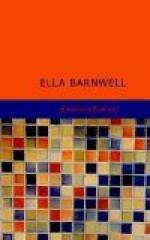Benjamin Younker was a man about fifty-five years of age—tall, raw-boned and very muscular—and although now past the prime, even the meridian of life, was still possessed of uncommon strength. His form, never handsome, even in youth, was now disfigured by a stoop in the shoulders, caused by hard labor and rheumatism. His face corresponded with his body—being long and thin, with hollow cheeks, and high cheek bones,—his eyes were small and gray, with heavy eye-brows; his nose long and pointed; his mouth large and homely, though expressive; and his forehead medium, surmounted by a sprinkling of brown-gray hair. In speech he was deliberate, generally pointed, and seldom spoke when not absolutely necessary. He was a good farmer—such being his occupation; a keen hunter, whenever he chose to amuse himself in that way; a sure marksman; and, although ignorant in book learning, possessed a sound judgment, and a common-sense understanding on all subjects of general utility. He was a native of Eastern Virginia, where the greater portion of his life had been spent in hunting and agricultural pursuits—where he was married and had been blessed with two children—a son and a daughter—of whom the former only was now living, and has already been introduced to the reader as Isaac—and whence, at the instance of his wife and son, he removed, in the spring of 1779, into the borders of Kentucky—finally purchased and settled where he now resided; and where, although somewhat exposed, he and his family had thus far remained unmolested.
The dame, Mrs. Younker, was a large, corpulent woman of forty-five, with features rather coarse and masculine, yet expressive of shrewdness and courage, and, withal, a goodly share of benevolence. She was one of that peculiar class of females, who, if there is any thing to be said, always claim the privilege of saying it; in other words, an inveterate talker; and who, if we may be allowed the phrase, managed her husband, and all around her, with the length of her tongue. In the country where she was brought up and known, to say of another, that he or she could compete with Ben Younker’s wife in talking, was considered the extreme of comparison; and it is not recorded that any individual ever presumed on the credulity of the public sufficient to assert that the vocal powers of the said Mrs. Younker were ever surpassed. Unlike most great talkers, she was rarely heard to speak ill of any, and then only such as were really deserving of censure; while her rough kind of piety—if we may so term it—and her genuine goodness of heart, known to all with whom she came in contact, served to procure her a long list of friends. She possessed, as the reader has doubtless judged from the specimen we have given, little or no education; but this deficiency, in her eyes, as well as in most of those who lived on the frontiers, was of minor consequence—the knowledge of hunting, farming, spinning and weaving, being considered by far the more necessary qualifications for discharging the social duties of life.




